|
||
      |
Peer Review ::
On the shelf
The Magazine publishes a selection of general-interest books by alumni authors. For additional alumni books, see In Their Own Words.
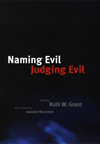 Studying
Youth Gangs, edited by James F. Short Jr., AM’49, PhD’51, and
Lorine A. Hughes, AltaMira Press, 2006. Because gangs range from neighborhood
social networks to hate groups, argue Short and Hughes, the study of youth
gangs can no longer be limited to theories of delinquency and deviance.
In this volume, the authors—including David S. Kirk, AM’02,
PhD’06, and Andrew Papachristos, AM’00—introduce and
examine new definitions of domestic and international gangs to better understand
criminal behaviors and how to regulate them.
Studying
Youth Gangs, edited by James F. Short Jr., AM’49, PhD’51, and
Lorine A. Hughes, AltaMira Press, 2006. Because gangs range from neighborhood
social networks to hate groups, argue Short and Hughes, the study of youth
gangs can no longer be limited to theories of delinquency and deviance.
In this volume, the authors—including David S. Kirk, AM’02,
PhD’06, and Andrew Papachristos, AM’00—introduce and
examine new definitions of domestic and international gangs to better understand
criminal behaviors and how to regulate them.
Naming Evil, Judging Evil, edited by Ruth W. Grant, AB’71, AM’75, PhD’84, University of Chicago Press, 2006. Although evil lies on one side of a clear-cut moral spectrum in Western philosophy, asserts Grant, the implications of labeling someone or something “evil” are anything but clear. What are the sources of evil? Why is evil often perpetrated in the name of good? Contributors to this volume, including Michael Allen Gillespie, AM’75, PhD’81, examine Western conceptions of evil by tackling questions of moral authority and moral judgment.
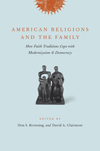 American Religions and the Family: How Faith Traditions
Cope with Modernization & Democracy,
edited by Don S. Browning, DB’59, AM’62, PhD’64, and
David A. Clairmont, AM’00, PhD’05, Columbia University Press,
2006. The American family, argue Clairmont and U of C professor emeritus
Browning, is influenced by both private religion and public processes of
modernization and democracy. Religious scholars, including Raymond S. Bucko,
PhD’92; Robert M. Franklin, PhD’85; Jeffrey F. Meyer, AM’69,
PhD’73; and Raymond Brady Williams, AM’63, PhD’66, debate
how different belief systems approach the family and respond to changing
attitudes toward sex, marriage, and family responsibilities.
American Religions and the Family: How Faith Traditions
Cope with Modernization & Democracy,
edited by Don S. Browning, DB’59, AM’62, PhD’64, and
David A. Clairmont, AM’00, PhD’05, Columbia University Press,
2006. The American family, argue Clairmont and U of C professor emeritus
Browning, is influenced by both private religion and public processes of
modernization and democracy. Religious scholars, including Raymond S. Bucko,
PhD’92; Robert M. Franklin, PhD’85; Jeffrey F. Meyer, AM’69,
PhD’73; and Raymond Brady Williams, AM’63, PhD’66, debate
how different belief systems approach the family and respond to changing
attitudes toward sex, marriage, and family responsibilities.
Our Living Manhood: Literature, Black Power, and Masculine Ideology, by Rolland Murray, AM’95, PhD’00, University of Pennsylvania Press, 2006. Black Power ideologies of masculinity have led to criticisms about the movement’s misogynistic rhetoric linking masculinity with radical politics. Murray challenges these criticisms by looking at black male authors—including James Baldwin, Clarence Major, and John Oliver Killens—who have called Black Power gender ideals into question.
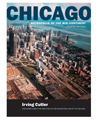 Chicago: Metropolis of the Mid-Continent, by Irving Cutler, AM’48,
Southern Illinois University Press, 2006. Chicago is one of the nation’s
foremost cities, but how did it get there? Cutler explores the development
of Chicagoland, weaving together history, economy, geography, and the city’s
culture with an analysis of its diverse neighborhoods. The book includes
nearly 300 photographs, drawings, maps, and tables.
Chicago: Metropolis of the Mid-Continent, by Irving Cutler, AM’48,
Southern Illinois University Press, 2006. Chicago is one of the nation’s
foremost cities, but how did it get there? Cutler explores the development
of Chicagoland, weaving together history, economy, geography, and the city’s
culture with an analysis of its diverse neighborhoods. The book includes
nearly 300 photographs, drawings, maps, and tables.
Worshipping the Myths of World War II: Reflections on America’s Dedication to War, by Edward W. Wood Jr., PhB’47, Potomac Books, Inc., 2006. Reflecting on America’s misguided perceptions of war, Wood, a World War II veteran, refutes four war myths that arose during the 1940s. He uncovers the realities behind fighting “the good war,” the glorification of war in memoirs and novels, the belief that the U.S. won WW II “on our own,” and the effect the Holocaust had on national conceptions of evil, arguing that some of these myths have been sustained and have overshadowed the grim realities behind the current war on terror.
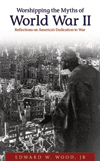 One Country: A Bold Proposal to End the Israeli-Palestinian
Impasse, by
Ali Abunimah, AM’95, Henry Holt and Company, 2006. Imagine Israelis
and Palestinians sharing one state with equal rights and responsibilities.
Palestinian American Abunimah proposes this solution to the Middle East
conflict while delineating the problems and possible dangers of a two-state
approach. Peace, the author argues, can only come when Palestinians and
Israelis conceive a new relationship that includes acknowledging a shared
history and empathy for the other side.
One Country: A Bold Proposal to End the Israeli-Palestinian
Impasse, by
Ali Abunimah, AM’95, Henry Holt and Company, 2006. Imagine Israelis
and Palestinians sharing one state with equal rights and responsibilities.
Palestinian American Abunimah proposes this solution to the Middle East
conflict while delineating the problems and possible dangers of a two-state
approach. Peace, the author argues, can only come when Palestinians and
Israelis conceive a new relationship that includes acknowledging a shared
history and empathy for the other side.
Anthropology and Social Theory: Culture, Power, and the Acting Subject, by Sherry B. Ortner, AM’66, PhD’70, Duke University Press, 2006. Combining ethnography with social theory, anthropologist Sherry Ortner tackles some of the questions plaguing the social sciences in the 21st century. What does “culture” mean in the contemporary world? How does individual agency come into play? Through practical ethnographic studies, Ortner demonstrates how reconceptualizing culture can help us understand issues of race, social class, and human subjectivity.
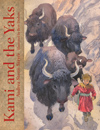 The
Best-Ever Wheat- and Gluten-free Baking Book, by Mary Ann Wenniger
and Mace Wenniger, AB’48, AM’51, Fair Winds Press, 2005. Quinoa
peanut butter cookies, carob fudge cake, blueberry, muffins, baked rice
pudding, millet spoon bread: these are a few of the 200 recipes for wheat-
and gluten-free goods in this comprehensive cookbook. Interspersed with
the recipes are brief histories of the 33 kinds of flours and grains, as
well as tips on baking with low-sugar wheat alternatives.
The
Best-Ever Wheat- and Gluten-free Baking Book, by Mary Ann Wenniger
and Mace Wenniger, AB’48, AM’51, Fair Winds Press, 2005. Quinoa
peanut butter cookies, carob fudge cake, blueberry, muffins, baked rice
pudding, millet spoon bread: these are a few of the 200 recipes for wheat-
and gluten-free goods in this comprehensive cookbook. Interspersed with
the recipes are brief histories of the 33 kinds of flours and grains, as
well as tips on baking with low-sugar wheat alternatives.
Kami and the Yaks, by Andrea Stenn Stryer, U-High’53, AB’57, AM’58, Bay Otter Press, 2007. In this story intended for 5- to 8-year olds, when his family’s yaks go missing, Kami, a deaf Sherpa boy, uses his heightened sense of observation to find the animals. Illustrations by Bert Dodson capture the Himalayan landscape.